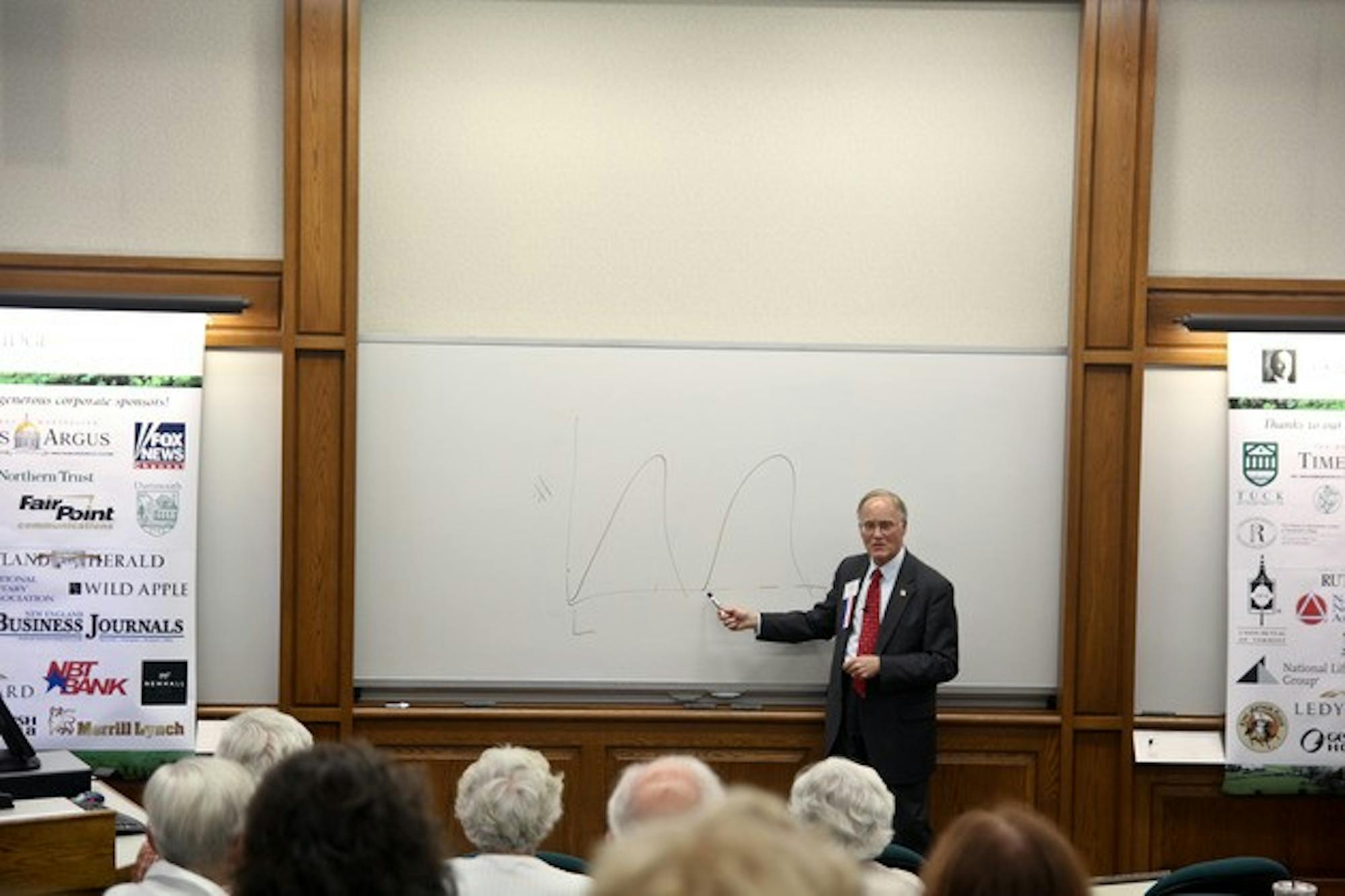The coins were stored in chests on a horse-drawn wagon, but early in the journey the wagon careened off course, breaking the chests open and scattering the gold coins down a hillside.
"Everyone around came out with lanterns and got all those coins," Former Gov. Jim Douglas, R-Vt., said in the inaugural talk of the "Interesting People, Interesting Times" lecture series, at the Tuck School of Business Thursday afternoon. "Even back then, Vermonters proved to be such honest people that not a single gold coin was pocketed during the recovery effort."
Moments like these in Vermont's past capture the unique and critical role of the state in the greater context of the nation's political history, according to Douglas.
In the lecture, Douglas discussed both Vermont's history as a leading progressive state model and his concerns about the current state of American politics.
"Vermont has been the home for a lot of interesting folks involved in the national political scene and it is necessary to look at where we are now compared to where we have been in the past," Douglas said to an audience of approximately 50 students and community members.
Even before joining the union in 1791, Vermont was known as a rebellious but influential colony, Douglas said, citing the fact that Vermont was one of only three states to have ever declared itself independent, along with Hawaii and Texas.
"We really stuck our neck in the yoke of the union," he said.
Vermont was a formidable threat to the federal government. Douglas said.
Many towns in New York and Massachusetts began to apply for admission into "greater Vermont" in the 1780s, which greatly unsettled Congress, Douglas said.
When the federal government considered taking forceful action against Vermont, which it saw as a legitimate political threat, then-President George Washington wrote a strongly-voiced letter asking Congress to reconsider their plan, Douglas said.
"Washington said himself that the Vermonters were the best soldiers he ever had during the Revolution and that it was unlikely they could be so easily taken down," Douglas said.
Douglas also described Dartmouth's own connection to the Green Mountain State's notably rogue colonial history.
In the late 1700s, founder of the College Eleazar Wheelock had planned to make Dartmouth the official state university of Vermont.
Rather than wait for Wheelock to freely make this decision, Vermont legislators attempted to force the measure to pass by annexing the land surrounding Dartmouth.
Ethan Allen, one of the state's founding fathers, was extremely embarrassed by the behavior of the Vermont policymakers in the Dartmouth negotiations, Douglas said.
"Allen called out the Vermonters as restless, uneasy men and asked New Hampshire to excuse the imbecility of Vermont," he said.
Despite the antics and colorful anecdotes of policymakers from Vermont's earlier history, Douglas said that the state has long been a political leader on the national scene.
In 1777, Vermont became the "first jurisdiction on the continent" to prohibit slavery and showed record-high support for Abraham Lincoln in the 1860 presidential election.
Douglas also discussed Vermont's most high-profile politicians, including former President Chester Arthur from North Fairfield, Vt., former Vice President Levi Morton from Shoreham, Vt. and former President Calvin Coolidge from Plymouth, Vt., after whom the sponsoring foundation was named.
The Calvin Coolidge Memorial Fund sponsored the series.
"Coolidge worked to limit the scope of government and assure that prosperity continued, and we can look to him to determine where we stand politically today," Douglas said.
Citing recent approval ratings of Congress, Douglas said that the current state of American politics has "not been very satisfying," largely due to the partisan nature of the political environment today,
"Looking at the economic recession and the size of our national debt, it's hard to say if we really are recovering well," Douglas said. "What troubles me is the polarization of the national political scene today that no longer gives us an opportunity to deal with issues like we could have in the past."
Past political parties' strength was largely due to their diversity, Douglas said.
"It was great to see people with different ideas bringing their thoughts into the cauldron of legislation," he said. "That's what was great about the Senate [in the 1950s] nothing ever passed on a party line vote."
Douglas suggested a variety of reforms, including revising term limits and reassessing the media's constant presence in society to address the issues of political polarization. In the past, the national political scene was not plagued by the vicious partisanship seen in American politics now, Douglas said.
"I worry about the state of our republic and whether we can all function as a society that has responsibilities," Douglas said. "I wonder if we can go back to Coolidge's time, where politicians did their best to leave the scene better than they found it."
Douglas also said, however, that he is "tentatively optimistic" about the current state of American politics.
"I hope in the upcoming election we'll think about the giants who have gone before us," he said. "People should insist on the kind of change and stability that we saw in the past."
The Coolidge Lecture Series is sponsored by the Tuck School of Business and the Rockefeller Center and has been relocated to Tuck from the President Calvin Coolidge Museum and Education Center in Plymouth Notch, Vt.
The next lecture in the series, given by former College President James Wright, will take place on July 18.




